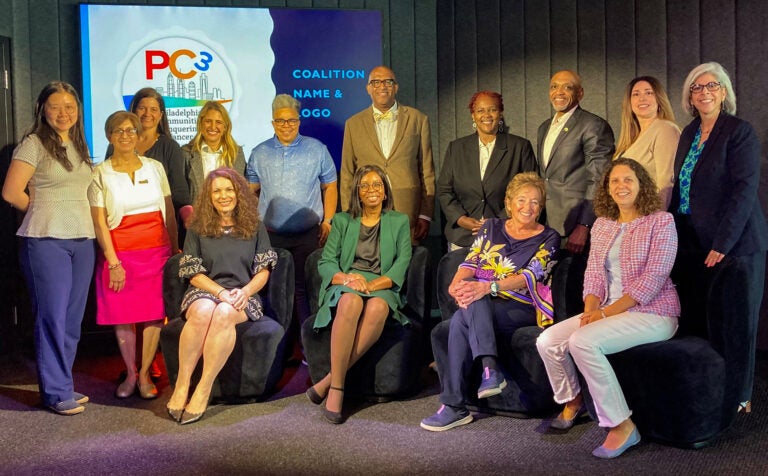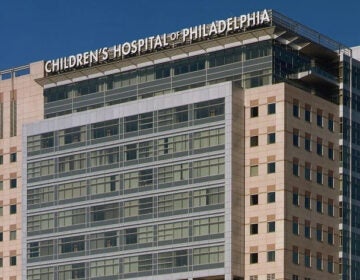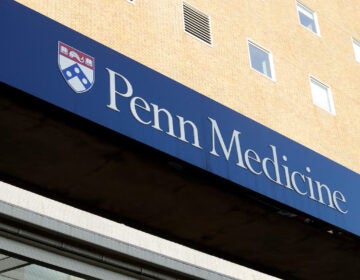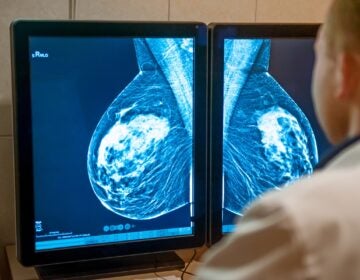Philadelphia’s largest cancer centers unite to reduce disparities in prevention and treatment outcomes
The Philadelphia Conquering Cancer Coalition aims to remove barriers and improve communication and collaboration between various health centers and community organizations.
Listen 1:23
Philadelphia Communities Conquering Cancer leadership and members of the planning committee for the first Citywide Cancer Disparities Conference, June 2023. (Anthony Copploa/Sidney Kimmel Cancer Center)
From Philly and the Pa. suburbs to South Jersey and Delaware, what would you like WHYY News to cover? Let us know!
Philadelphia is home to some of the country’s top cancer care centers, but many patients in the city struggle to access preventative care and treatment.
Cancer incidence and mortality rates remain especially high in certain neighborhoods, including Strawberry Mansion, Nicetown-Tioga and Lower Kensington, according to data from Drexel University. These areas also, on average, have more poverty and other cancer risk factors like obesity, smoking, poor diet and alcohol consumption.
Researchers and members of the Philadelphia Communities Conquering Cancer coalition, or PC3, are now focused on improving cancer care communication and coordination by leveraging new partnerships with community organizations and trusted neighborhood messengers.
The coalition is led by researchers at the University of Pennsylvania’s Abramson Cancer Center, Temple University’s Fox Chase Cancer Center and Thomas Jefferson University’s Sidney Kimmel Comprehensive Cancer Center.
“There’s so many people who just don’t have the education about cancer … or just need to hear it from a survivor or need to hear it from someone else that they trust,” said epidemiologist Charnita Zeigler-Johnson. “Getting that information into people’s hands would go so far and make a huge difference.”
Cancer is the second-leading cause of death in Philadelphia after heart disease, according to city reports. Over 2,700 residents died from the disease in 2021, the most recent year of available data.
Lung cancer was the most common, accounting for about one in five cancer deaths in the city. Others suffered from colorectal, breast and prostate cancers.
Zeigler-Johnson, associate director for community outreach and engagement at Fox Chase Cancer Center at Temple Health, works with other coalition researchers at other cancer centers to identify interventions and models that the city could use to reach people in underserved communities.
Part of that work is collaborating with community organizations, the “boots on the ground,” to help bring resources, information and services directly into neighborhoods.
Amy Leader, associate director for community outreach and engagement at Jefferson Health’s Sidney Kimmel Comprehensive Cancer Center, said it’s important to first get input from people in those communities about their health care needs and gaps in care.
“The community members are very interested in cancer prevention,” Leader said. “You know, ‘What are the things that we can do to remain healthy? How can we get to cancer screenings? How can we keep ourselves healthy and avoid cancer?’”
Leader said the coalition is working closely with community organizations to identify and address other barriers to care, like transportation issues, lack of insurance or an inability to take time off from work for medical appointments or cancer screenings.
The coalition is also partnering with organizations to train and educate outreach workers and residents on how people in their neighborhoods can get involved with cancer research.
Zeigler-Johnson said it doesn’t always have to involve enrolling in clinical drug trials or medical testing.
“There are other ways that community members can really get engaged with the research process with reviewing research, evaluating it, helping us figure out which things get funded, advising on what the protocol should look like and what kinds of questions we should be asking as scientists,” she said.
The Philly coalition was founded in 2021 with funding from the nonprofit Patient-Centered Outcomes Research Institute. PC3 will soon host its second citywide cancer disparities conference this month and distribute new grants to community organizations and institutions.
“Everybody’s been touched by cancer,” Zeigler-Johnson said. “I think we learn so much from one another, and that’s what the goal of this is.”

Get daily updates from WHYY News!
WHYY is your source for fact-based, in-depth journalism and information. As a nonprofit organization, we rely on financial support from readers like you. Please give today.





